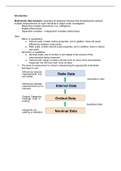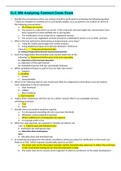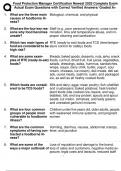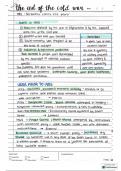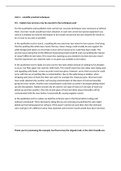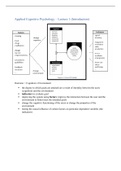1
Research project design
Teuntje Wenting (2818359)
Faculty of Law, Vrije Universiteit Amsterdam
R_Res.meth.c: Research Methodology on Conflict and International Crimes
December 22, 2023
Word count: 3162
, 2
Contents
1. Introduction……………………………………………………………………………3
2. Methodology………………………………………..…………………………………4
2.1 Choice of research method………………………………………..…...4
2.2 Subjects of study……………………………………………...……….5
2.2.1 Population and sampling plan…………………………………5
2.2.2 Ethical considerations…………………………………………6
2.3 Measurement and operationalization………………………………….6
2.3.1 Conceptualization……………………………………………..6
2.3.2 Operationalization of quantitative variables…………………..7
2.4 Data collection…………………………………………………………7
2.4.1 Qualitative data collection…………………………………….7
2.4.2 Quantitative data collection…………………………………...8
2.5 Data processing and analysis plan …………………………………....9
2.5.1 Quantitative data analysis……………………………………..9
2.5.2 Qualitative data analysis………………………………………9
2.5.3 Integration quantitative data analysis and qualitative data
xxxxxxxxxxxxanalysis……………………………………………………….10
3. Strengths and limitations..……………………………………………………………10
References……………………………………………………………………………………12
, 3
1. Introduction
As of 2023, Cyprus is positioned at the 31st spot among the 35 European countries assessed
in the Global Peace Index. This ranking suggests elevated levels of violence, crime, political
instability, and militarization in the region, as reported by the Institute for Economics &
Peace (2023). These conditions have been shaped by the enduring conflict in Cyprus,
stemming from its deep-rooted ethnic and religious divisions. Since 1974, the southern part
of Cyprus has been under the control of Greek Cypriots and the northern part, governed by
Turkish Cypriots, proclaimed itself the ‘‘Turkish Republic of Northern Cyprus’’, but has not
been recognized by any country other than Turkey. However, Turkish troops remain on
Cyprus which results in a buffer zone, patrolled by the UN Peacekeeping Force which
separates the two parts of Cyprus (Danielidou & Horvath, 2006; Kouros & Papadakis, 2018;
Office of International Religious Freedom, 2018).
Consequently, the island is divided into Greek- and Turkish Cypriot communities
which makes Cyprus a very heterogeneous society, with two nationalities that stem from
historic, ethnic, linguistic and religious differences (Danielidou & Horvath, 2006; Pollis,
1996). The majority of Greek Cypriots of the southern part identify as Orthodox Christians
(89,1%) and Turkish Cypriots on the northern part identify as Sunni Muslim (97%)
(European Commission, 2019; Office of International Religious Freedom, 2018).
The history of conflict influences the perceived threat of the other group amongst the
divided Cyprus society. Research shows that feelings of victimization and perceived
differences in social identity among Greek Cypriots predicted negative attitudes towards
Turkish Cypriots (Danielidou & Horvath, 2006) – and in extension Muslims because of the
high religious affiliation among Turkish Cypriots (European Commission, 2019; Office of
International Religious Freedom, 2018).
Hostility or negative attitudes towards outgroups emerge from the perception that the
interests of one’s own group, the in-group, are threatened by an out-group (Campbell, 1965;
Coser, 1956). The group conflict theory states that the larger the out-group, the more likely
members of the majority-group to see them as a threat and therefore resort to violence (Coser,
1956; Meuleman et al., 2009; Schlueter & Scheepers, 2010; Strabac & Listhaug, 2008).
Given the highly divided and heterogeneous society of Cyprus (Danielidou &
Horvath, 2006; Pollis, 1996), exploring the influence of negative attitudes towards the
outgroup on violence becomes particularly interesting. Hence, this research is grounded in the
group conflict theory, aiming to investigate the following research question: To what extent
Research project design
Teuntje Wenting (2818359)
Faculty of Law, Vrije Universiteit Amsterdam
R_Res.meth.c: Research Methodology on Conflict and International Crimes
December 22, 2023
Word count: 3162
, 2
Contents
1. Introduction……………………………………………………………………………3
2. Methodology………………………………………..…………………………………4
2.1 Choice of research method………………………………………..…...4
2.2 Subjects of study……………………………………………...……….5
2.2.1 Population and sampling plan…………………………………5
2.2.2 Ethical considerations…………………………………………6
2.3 Measurement and operationalization………………………………….6
2.3.1 Conceptualization……………………………………………..6
2.3.2 Operationalization of quantitative variables…………………..7
2.4 Data collection…………………………………………………………7
2.4.1 Qualitative data collection…………………………………….7
2.4.2 Quantitative data collection…………………………………...8
2.5 Data processing and analysis plan …………………………………....9
2.5.1 Quantitative data analysis……………………………………..9
2.5.2 Qualitative data analysis………………………………………9
2.5.3 Integration quantitative data analysis and qualitative data
xxxxxxxxxxxxanalysis……………………………………………………….10
3. Strengths and limitations..……………………………………………………………10
References……………………………………………………………………………………12
, 3
1. Introduction
As of 2023, Cyprus is positioned at the 31st spot among the 35 European countries assessed
in the Global Peace Index. This ranking suggests elevated levels of violence, crime, political
instability, and militarization in the region, as reported by the Institute for Economics &
Peace (2023). These conditions have been shaped by the enduring conflict in Cyprus,
stemming from its deep-rooted ethnic and religious divisions. Since 1974, the southern part
of Cyprus has been under the control of Greek Cypriots and the northern part, governed by
Turkish Cypriots, proclaimed itself the ‘‘Turkish Republic of Northern Cyprus’’, but has not
been recognized by any country other than Turkey. However, Turkish troops remain on
Cyprus which results in a buffer zone, patrolled by the UN Peacekeeping Force which
separates the two parts of Cyprus (Danielidou & Horvath, 2006; Kouros & Papadakis, 2018;
Office of International Religious Freedom, 2018).
Consequently, the island is divided into Greek- and Turkish Cypriot communities
which makes Cyprus a very heterogeneous society, with two nationalities that stem from
historic, ethnic, linguistic and religious differences (Danielidou & Horvath, 2006; Pollis,
1996). The majority of Greek Cypriots of the southern part identify as Orthodox Christians
(89,1%) and Turkish Cypriots on the northern part identify as Sunni Muslim (97%)
(European Commission, 2019; Office of International Religious Freedom, 2018).
The history of conflict influences the perceived threat of the other group amongst the
divided Cyprus society. Research shows that feelings of victimization and perceived
differences in social identity among Greek Cypriots predicted negative attitudes towards
Turkish Cypriots (Danielidou & Horvath, 2006) – and in extension Muslims because of the
high religious affiliation among Turkish Cypriots (European Commission, 2019; Office of
International Religious Freedom, 2018).
Hostility or negative attitudes towards outgroups emerge from the perception that the
interests of one’s own group, the in-group, are threatened by an out-group (Campbell, 1965;
Coser, 1956). The group conflict theory states that the larger the out-group, the more likely
members of the majority-group to see them as a threat and therefore resort to violence (Coser,
1956; Meuleman et al., 2009; Schlueter & Scheepers, 2010; Strabac & Listhaug, 2008).
Given the highly divided and heterogeneous society of Cyprus (Danielidou &
Horvath, 2006; Pollis, 1996), exploring the influence of negative attitudes towards the
outgroup on violence becomes particularly interesting. Hence, this research is grounded in the
group conflict theory, aiming to investigate the following research question: To what extent



